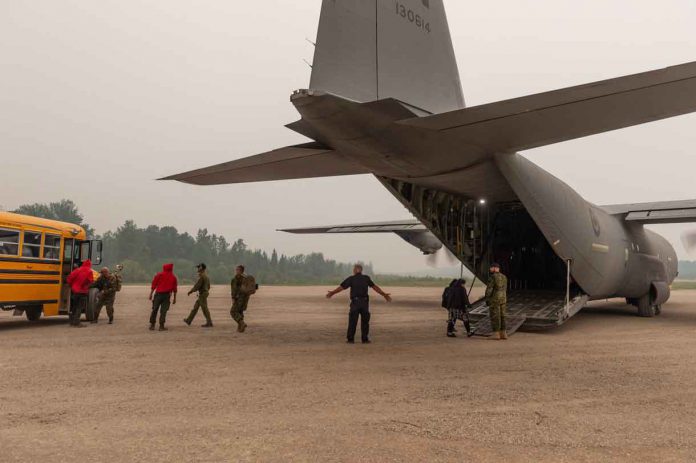Pikangikum, Ontario – Premier Doug Ford visited Thunder Bay two day ago as fires continue to burn out of control across the region. Evacuees from five northern First Nations numbering in the thousands are scattered across the province as they seek safety and refuge, many of them in Thunder Bay and surrounding areas.
Community members from Pikangikum First Nation, Poplar Hill First Nation, North Spirit Lake First Nation, Cat Lake First Nation, and Deer Lake First Nation have been evacuated to municipalities, and more recently into the First Nation community of Lac Seul First Nation, with no word on when they will be able to safely return home.
However, with over 140 fires raging in northwestern Ontario, the province is challenged to host all those who may need to be evacuated in the coming days. As a result, a First Nations-led Emergency Management system has already been deployed to evacuate and host members of Pikangikum First Nation in communities across the region.
Upon Pikangikum Chief Owen and Council declaring a state of emergency in their community on July 13, Pikangikum’s Tribal Council, the Independent First Nations Alliance (IFNA), activated their Emergency Operations Centre (EOC), allowing the community to respond to the escalating crisis.
IFNA is continuing to pursue local and First Nations contacts for evacuation locations in the event that further community members will need a safe place to go.
Premier Ford today again offered beds in the Toronto area. “We have lots of spaces in Toronto and the GTA,” explained Premier Ford. “If they’re willing to come down to the GTA and Toronto, we’ll be there and we’ll welcome them with open arms.”
Many see this offer as an example of the province’s urban-centric emergency management plan.
“The province has resources that we don’t have,” said Mathew Hoppe, CEO of IFNA. “They have aircraft. They have pilots. However, we’ve found that the provincial emergency response system is sometimes limited in the north in terms of response time to remote communities and cultural awareness.”
Pikangikum Chief and Council have previously declined having community members hosted in Toronto.
Pikangikum Chief Dean Owen stated, “As much as possible, we want to keep our people close to home, in a familiar setting, to minimize the traumatic impact that this evacuation is having on our community.”
Pikangikum, located approximately 100 km northwest of Red Lake, ON, has no direct road access for most of the year. With no traffic, its 4000 residents are not accustomed to life in southern urban centres. Hoppe says, “We need northern solutions to northern emergencies. We cannot scatter our community members across the province, in large urban centers like in the GTA, without support, family, or familiarity. This will incur a larger crisis than the one we are already facing.”
This is why IFNA created its own Emergency Operations Centre in 2019, in response to the 2019 fires in Pikangikum which required two full community evacuations.
The Provincial Emergency Operations Centre (PEOC) did not have the capacity for such a large-scale evacuation in the far north, and IFNA stepped up to host evacuees closer to home.The provincial system, while better resourced, is lacking the cultural connection needed to safely
host First Nations communities. A First-Nations led emergency management system, like IFNA’s, is better positioned to respond to the unique needs of the community. “We are not just serving First Nations communities. We are the First Nations communities,” explained Hoppe. “We understand the
importance of cultural teachings, of family, of holistic health. We understand the hardships that community members are facing, whether they are in Pikangikum or in a host community. We’ve lived it. The provincial approach simply cannot meet the needs of our community members.”
IFNA’s emergency response has developed internal capabilities to respond to a multitude of emergency situations. It functions as a host community in the case of evacuations, providing lodging alongside cultural programming, and oversees all aspects of emergencies as they unfold. In the case of the current fires, IFNA has drone operations with thermal imaging underway, closely monitoring the situation in order to facilitate further evacuation or shelter in place if evacuation is not possible.
The model is so successful that it has been called on to support other First Nation communities, as it did when Neskantaga First Nation needed to be evacuated due to water plant failure resulting in further contaminating the community’s drinking water in 2020.
Hoppe adds, “IFNA’s emergency management is operationally ready. We are experienced with responding to many types of community emergencies and continue to be heavily relied upon when emergencies arise. We have experienced staff on the ground. All we need is the resources, the equipment, and the budget, make it sustainable.
“Back in 2019, with only two fires, IFNA filled a significant operational gap to support the evacuation of Pikangikum. This year, fires directly impact five communities and threatening more as fire season continues, with provincial resources stressed. We know the needs of First Nations communities differ from those of urban communities, and we are ready to both provide support to the province as well as access support from other groups to make sure those needs are met.”
IFNA has proposed building and staffing an evacuation centre in order to ensure that they are ready to host evacuees in future emergencies. Such a centre would allow communities to evacuate to one location, keeping families together, and minimizing the trauma that these emergencies cause and exacerbate.
Hoppe added, “the time has come for government to stand with and resource a First Nation led approach to emergency management. IFNA has proven its operational capability, resourcefulness, and dedication to ensuring that northern First Nations are respected and cared for with both excellence and compassion. We can and will take care of our people in the north by our people in the north. Climate change is showing us that the status quo is no longer unacceptable.”







